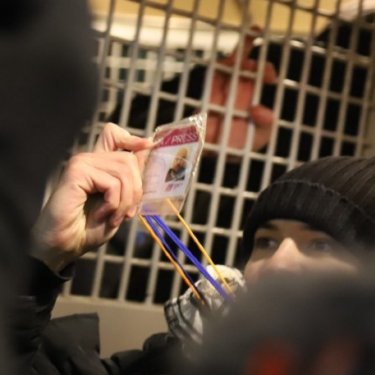Totally disproportionate crackdown on reporters during pro-Navalny demonstrations

Reporters Without Borders (RSF) calls for new European Union sanctions against Russian officials after more than 50 journalists were arbitrarily arrested – some briefly and some for several hours - during an unusually extensive and heavy-handed crackdown on media covering demonstrations in support of Kremlin opponent Alexei Navalny in 17 Russian cities on 23 January.
Читать на русском / Read in Russian
The extraordinary figure of more than 50 arrests of reporters, some of whom were subjected to police violence, is based on data compiled by the specialised news website OVD-Info, the Russian Journalists and Media Workers Union (JMWU) and information gathered directly by RSF.
“The police deliberately targeted certain media, going so far as to try to enter a private apartment, to cut off a video feed of the demonstrations, and in a sign of the totally disproportionate nature of the crackdown, even clearly-identified reporters wearing ‘press’ vests or armbands were held for several hours,” said Jeanne Cavelier, the head of RSF’s Eastern Europe and Central Asia desk.
“The aim was clearly to prevent them from showing the scale of support for a government opponent. We call on the Russian authorities to end this blatant obstruction of the freedom to inform and we urge the OSCE representative on freedom of the media, Teresa Ribeiro, to condemn the violence and arbitrary arrests. We also call on the European Union to adopt new sanctions against Russian officials.”
Multiple obstructions of the right to inform
Dozhd, an independent TV channel that is experienced in providing live coverage of demonstrations, was censored in mid-transmission when police cut the power supply to a Moscow apartment from which a Dozhd crew was broadcasting and then arrested reporter Aleksei Korostelev and cameraman Sergei Novikov on the pretext of verifying their identity. Another Dozhd journalist, Eduard Birmistrov, was arrested in Saint Petersburg although he was wearing a yellow vest and had his press card around his neck.
Cases of police deliberately obstructing journalists were filmed or reported throughout the day. They included the filmed arrest of Ivan Petrov, a reporter for the photo agency Tardigrada in Saint Petersburg, and the arrest of The Insider reporter Vera Ryabitskaya, who was beaten with a baton and dragged by her hair into a police van.
In Moscow, riot police hit Elizaveta Kirpanova, a reporter for the independent triweekly Novaya Gazeta, with their batons for several minutes, dealing some of the blows to her head, although she was clearly identifiable by her “press” vest and badge, while a baton blow smashed the camera lens of her photographer colleague Viktoria Odisonova.
Ekaterina Grobman, a reporter for VTimes, an independent news website recently founded by journalists who used to work for the daily newspaper Vedomosti, was hit when being arrested despite her “press” badge. Police also used violence against two journalists with the leading Riga-based news site Meduza, beating Kristina Safonova as she was filming a protest and grabbing Evgenyi Feldman by the neck. Nikita Stupin, a reporter for the AvtokazLive website, was tasered.
The police had already tried to intimidate journalists and media outlets in the run-up to the 23 January demonstrations in support for Navalny, who was arrested on his arrival in Russia on 17 January after several months in Germany recovering from a poisoning attempt. Navalny’s team has called for more protests on 31 January.
Russia is ranked 149th out of 180 countries in RSF's 2020 World Press Freedom Index.



